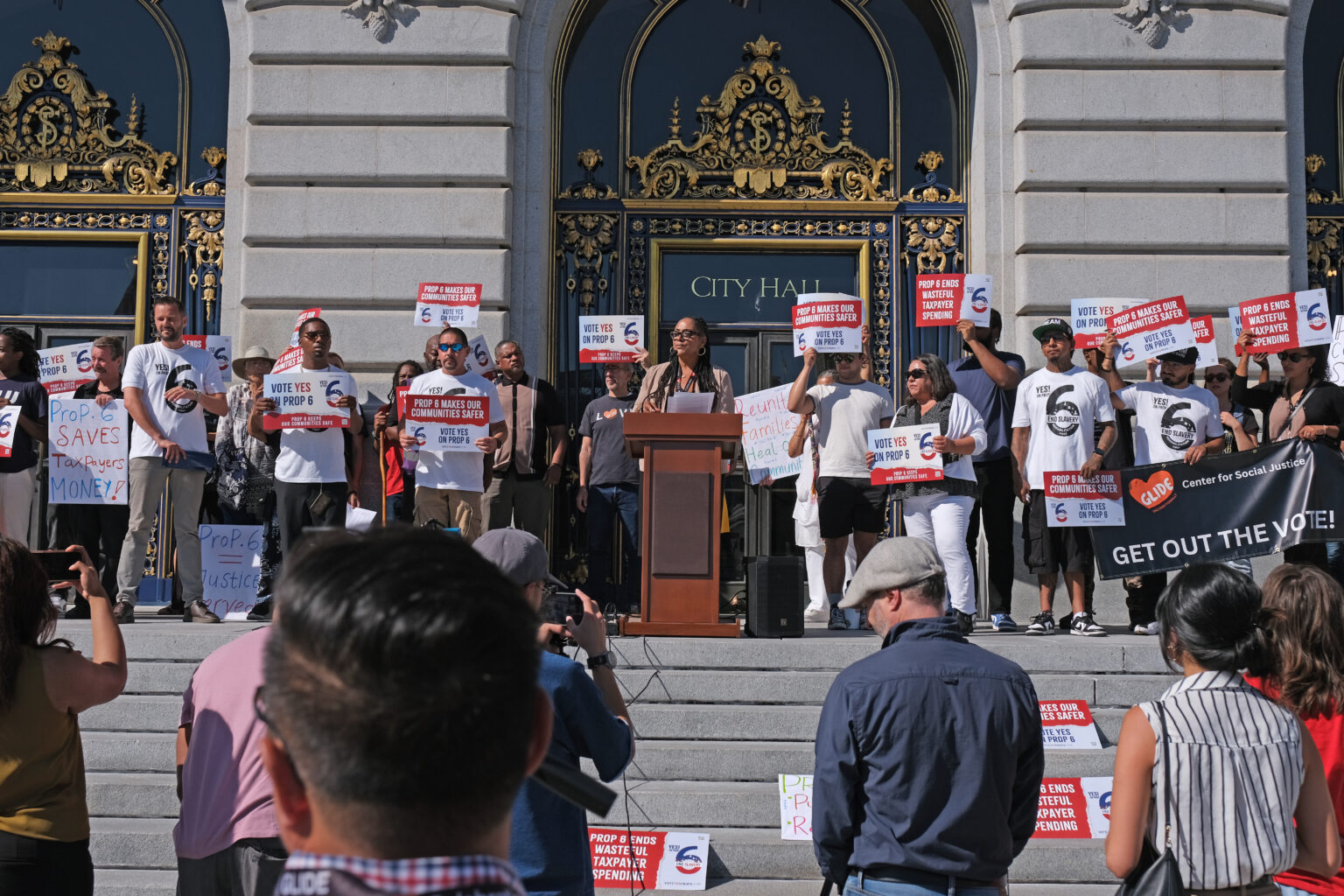
Yes on Prop 6: Let’s End Slavery in California
“Involuntary servitude is prohibited except to punish crime,” reads our California constitution, legalizing the enslavement of people convicted of crimes. As President & CEO of GLIDE Foundation, I call for voting yes on Proposition 6, “The End Slavery in California Act,” and removing this language of enslavement. Especially because Prop 6 will be more than a symbolic gesture; it will make a practical difference to the lives of people in prison.
Should this be done?
The question on Prop 6 is not “Should this be done?” But, “Why hasn’t this been done already?” GLIDE’s Center for Social Justice has been working on this for years alongside our coalition partners, co-sponsoring bills ACA 3 and ACA 8, fighting to qualify for the ballot. Now that it’s finally on the ballot, our community is phone banking for Prop 6 every week leading up to the election, an effort you can join here.
Why do we have to push so hard for something as basic as ending slavery in the 21st century? In 2022, voters in Alabama, Tennessee, Oregon, and Vermont voted to remove slavery and involuntary servitude from their states’ constitutions. Why are we behind? Why isn’t California leading the nation? How can the language of slavery still linger in the same year that a Black woman is running for President?
We all know that our justice system targets people of color. California imprisons Black men at ten times the rate of white men. This injustice is not by accident, but by design. Michelle Alexander’s bestselling book The New Jim Crow tells us, “African Americans are not significantly more likely to use or sell prohibited drugs than whites, but they are made criminals at drastically higher rates for precisely the same conduct.” Through a biased justice system, mass incarceration continues slavery under another name. Drop the euphemisms: “involuntary servitude,” “forced labor.” Call it what it is. Call it slavery.
Incarcerated are exploited
The exploitation of people in California prisons is absolutely unacceptable. We should be focusing on rehabilitating incarcerated people, not enslaving them. Incarcerated people are paid less than $1 per hour in California, and they are punished if they do not show up for work because they are sick or injured. Basic food and hygiene items purchased through the prison canteen can be up to double their retail cost. Minimum wage and labor protection laws do not apply to incarcerated workers. In the prison system, labor is forced through punishment, and there is no requirement to reward people fairly. Prop 6 will not guarantee minimum wage, but it may assist separate efforts to get incarcerated people fairer wages.
Currently, people in prison who decline work assignments can be punished with limitations on visits, phone calls, canteen purchases, yard time, entertainment, recreation access, and even delayed or denied parole. Once Prop 6 passes, California’s prisons will no longer be able to punish individuals for declining to work (though they will still be able to reward working).
Slavery is a business
Slavery is still big business in the United States, which is a disgrace. Nationally, forcing incarcerated workers to labor for next to nothing generates over $2 billion each year in goods and over $9 billion in services. In California, we earn and save at least hundreds of millions each year from prison slavery. However, this comes at the expense of time spent on rehabilitative activities. While corporations may profit from prison labor, it is the taxpayer who loses money when the person re-offends and incurs all the costs associated with the justice system.
The key to avoiding recidivism is giving incarcerated people time to pursue education, instead of filling all their time with slave labor. Education is absolutely key to rehabilitation. If people can get a diploma, take emotional intelligence courses, spend time in mental health and substance use treatment, we are investing in crime prevention. We are giving them the tools they need to turn their backs on crime and start a new life. Currently incarcerated people can be punished for choosing those activities over a work assignment.
Did you know incarcerated people make up about 30% of California’s firefighters? Despite risking life and limb fighting California’s wildfires, formerly incarcerated people face significant barriers getting hired as firefighters after they are released. The same is true for other types of jobs. We aren’t just sending people to prison: we’re limiting their economic opportunities, which ensures many will re-offend. There are all too few workplaces like GLIDE, where employees can safely and freely admit to their incarcerated past without fear of discrimination.
Help us pass Prop 6!
You can help Prop 6 pass in November with your vote, with your phone banking, with your conversations with your neighbors. When Prop 6 passes, we will all celebrate.
Slavery needs to end in every state, not just California. Racial bias in the justice system needs to end. Incarcerated people should get minimum wage. It will be a long road, but those who profit from modern-day versions of slavery will never triumph over the will of the people.